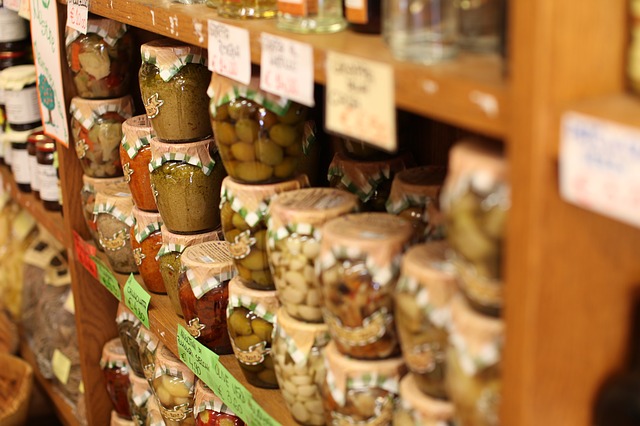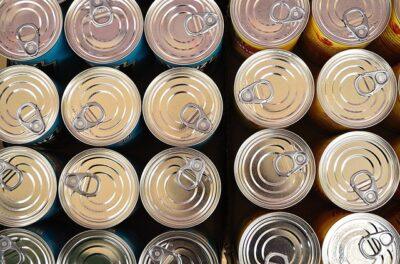Chances are good your stockpile is filled with commercially canned and home canned foods. A jam-packed food storage area is a necessity in these uncertain times, and preserving fresh vegetables and foods is one of the best ways to store food for future shortages.
Of course, canning foods at home is economical and easy. Yet there are some differences between home canning and factory canning that are important to understand in order to choose effective stored items to feed your family in the future.
Food safety is no trivial concern, and the safety of your stored supply should be foremost in your mind. Spoiled emergency food is more than a liability; it could kill. Botulism is a real danger in canned foods, but you can learn to safeguard yourself and recognize spoilage in preserved foods. With proper storage techniques, monitoring and labeling, you will have a reliable and ready supply of food when you need it.
Make ‘Off-The-Grid’ Super Foods Just Like Grandma Made!
It is difficult to determine how long canned goods can be safely stored. While most experts agree that canned goods cannot be stored forever, the truth is that not many studies have been performed. These days, people are usually too wary of the expiration dates stamped on commercial products to keep and eat food stored after these dates; most “expired” cans are thrown away. Canned goods do not require a “best before” date, because they are shelf-stable when their packaging remains undamaged. Most commercially canned foods will have a date on them showing about three years from packing. According to the USDA, high-acid canned foods can be eaten for about a year and a half, and low-acid foods for five years after packing. Many foods will still be edible for a long time after that, though.
Canned goods prepared under proper conditions and stored properly are sterile; however, they do suffer some nutritional loss. In 1974, scientists conducted tests on a supply of canned goods that were more than 40 years old. They evaluated nutritional content and bacterial spoilage, and found that the canned foods were safe to eat. Vitamin A and C content has been shown to drop in canned foods, and in some by as much as 5-20 percent annually. The safety of the canned items is only compromised if the can itself becomes damaged.
The conditions under which canned foods are stored is an important concern. Cans should be kept between 40 and 70 degrees Fahrenheit, and prevented from freezing and overheating. They must be stored in spaces relatively free of moisture and out of danger of being damaged. Dented, rusted and broken cans can harbor unsafe food, because flaws in the packaging can allow air and bacteria access to the food inside. Foods stored in glass jars must be protected from light exposure and, of course, breakage.
Monitor and document your canned foods carefully to ensure they will be safe to eat when you need them. All cans and jars should be labeled and marked with their contents and packaging date, so they will be identifiable if the paper labels are detached. If you create an inventory, you can keep track of any incidents that may affect the shelf life, as well as plan what to eat first to make sure older food is consumed before newer items.
The Quickest And Easiest Way To Store A Month’s Worth Of Emergency Food!
It is important to be able to recognize unsafe foods in your stored supply; carefully observing cans and maintaining records will help you notice if the appearance of cans changes. According to the CDC, food may be contaminated if the container is leaking, bulging, swelling or if the food inside is foaming, moldy or smells bad. Don’t take unnecessary risks with your food; throw away anything that seems suspect without tasting it.
Anecdotal evidence of storing home-canned goods and eating after five to 10 years exists; not too long ago it was not uncommon to store food for hard times and eat it many years later. Despite this, most canning experts and food safety agencies recommend eating home-canned goods no more than two years after packaging. The difference between home and commercially canned foods is in the preparation; it is more difficult to maintain sterile conditions at home than within a commercial processing facility. Properly observing canning standards can ensure safer, longer-lasting home-canned goods; it is essential to learn how to preserve sterilization if you want to rely on home canning.
Canned foods are among the best options for stockpiling. Be certain to store all preserved food under proper conditions to ensure its viability to sustain you when you need it. If you are home-canning for your stockpile, you absolutely must observe rigorous sanitation practices throughout the canning process. Monitor all canned goods for signs of spoilage, and don’t risk the serious illness or death that may result from eating spoiled items. With careful preparation, storage and routine inspection, your home-canned goods can become an important part of your long-term food plan and contribute to the security of your family in times of shortage.
Related:
How Long Will Frozen Food Really Last Before It Goes Bad?
What is your experience – how long have your canned foods lasted? Share your observations in the section below:
Harness The Power Of Nature’s Most Remarkable Healer: Vinegar
 Off The Grid News Better Ideas For Off The Grid Living
Off The Grid News Better Ideas For Off The Grid Living






